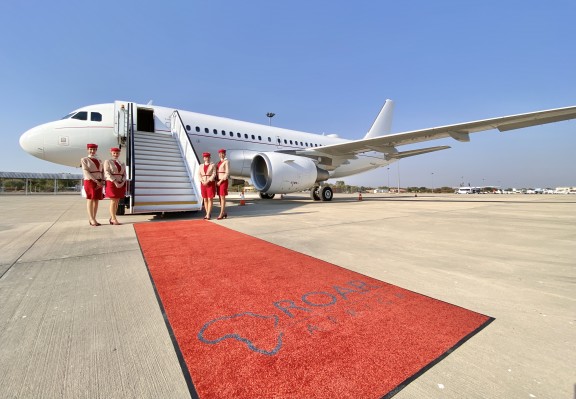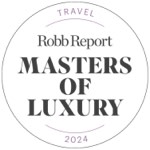
Boundary-pushing travel experience lures tourists back to Africa
Almost 18 months to the day since Covid-19 made its ill-fated arrival, devastating the lives of millions and hitting the tourism industry hardest, Deborah Calmeyer – founder and CEO of luxe travel specialist ROAR AFRICA – achieved the seemingly impossible by setting off on an extraordinary journey that took just 10 guests to four of Africa’s most iconic destinations on an Emirates A319 private jet.
While a month earlier Richard Branson and Jeff Bezos spent millions on their vanity space trips, Calmeyer’s creation of “The Greatest Safari on Earth’’ to kickstart travel back to Africa, saving the livelihoods of thousands of people and the lives of animals, seems far more impressive. An Olympic torch for African tourism, it is visionary and formidable to pull off such a trip at any time, let alone when the travel and airline industries are in constant flux and Covid-19 regulations change by the hour.
But then this Zimbabwean-born travel specialist, who lives between Cape Town and New York, is known for dreaming big. And for daring to suggest that we see familiar things with new eyes rather than constantly seeking new landscapes. “For too long, willful ignorance has played a major part in the psyche of travellers,” she says. “Combining an adventure-filled travel experience that ticked all the comfort boxes with illustrating how our collective buy-in can ensure their protection and survival is what we set out to do.” And luxurious it most certainly was. One can only imagine the awe with which the guests settled into their luxurious suites on what would be their mode of transport for the next 12 days.
Originally designed to hold 150 passengers, the customised Emirates jet accommodates just 10 guests, complete with private suites in classic walnut and marble with flatbeds, feather pillows, fine linens, personal 32-inch TV screens and a private shower spa and powder room. Guests also had full use of an expansive communal lounge and dining area where they enjoyed fine dining and a showstopper wine list. “I wanted to replicate the allure and luxury associated with flying Concorde in the 1970s.
“It wasn’t just a jet but an exclusive club,” says Calmeyer, who has combined the adventure of travel in Africa with the feeling of a member’s club for informed, conscious travellers.
“Emirates has always been my airline of choice to on. Their ethos on sustainable travel echoes our own,” she says. “I was impressed to discover they had implemented a complete ban on hunting trophies, even in cases where the shipment may be considered legal under CITES rules.
“Africa’s most profound and phenomenal experiences illustrate that it is ready and waiting for us to return and that it is safe and reliable to do so.”
Samoan journalist and development entrepreneur Lelei LeLaulu once said tourism signalled the largest voluntary transfer of cash from the rich to the poor in history. Calmeyer concurs: “Post Covid-19, I think sustainable tourism may well be the only real source of development money.”
And so the ROAR AFRICA Emirates Executive Private Jet Safari was born. “We know our clients to be curious explorers whose love of travel is as much to see the world through another’s eyes as it is to conserve the essence and particularity of these places that are now in an even more precarious position,” says Calmeyer.
The epic journey took off from Zimbabwe’s Victoria Falls to Botswana’s Okavango Delta, Kenya’s Maasai Mara and Rwanda’s Volcanoes National Park, where some of the world’s last mountain gorillas live.
“We selected these profound and phenomenal African experiences specifically because if you asked me to see all of southern Africa in one fell swoop, these would be the places I’d recommend. Without the tourism industry and the protection it affords, these wilderness areas could be in their last days.
“That we can’t rely on governments, conservation organisations or landowners alone to protect the world’s last remaining wild spaces is the reality; it’s up to those of us who value these areas the most to make certain others come to understand their value too.”
“The decision to travel to Africa comes with enormous responsibility in that tourism has proven itself a powerful catalyst to the kinds of economic and philanthropic miracles that change people’s lives,” says Calmeyer.
“When many of us may feel helpless as to how we can affect change around issues like climate change, women’s empowerment, conservation, employment and sustainability, I look to what millions of women and men throughout history have done before us when in crisis,” says Deborah. “They got out into nature.”
As such, the Greatest Safari on Earth offered the ultimate in wonder and adventure with a handpicked selection of local success stories, conservation change makers and those conservationists at the frontline of wildlife protection. For example, at Victoria Falls in Zimbabwe, guests stayed at Matetsi Victoria Falls, a family-owned five-star lodge on the banks of the Zambezi River, which comes with its own remarkable back-from-the-brink story. It was here that Joseph Dhafana, a Zimbabwean world-class sommelier, did a surprise wine tasting for guests.
“Joseph appeared in Blind Ambition, a documentary that premiered at the Tribeca Film Festival in New York earlier this year,” says Calmeyer, “so it was a big surprise to have him join us.” Dhafana’s story is remarkable. He arrived in SA 10 years ago as a refugee and just seven years later represented SA at the World Blind Wine Tasting in France before returning in 2018 with an all-Zimbabwean team. “It’s a reminder of the power of the human spirit and the serendipity of finding a mentor who recognises something unique in you. There are countless incredible stories like his in Africa, and plenty more that are waiting to happen.”
Another highlight was Michael Charton, a master storyteller who joined the group at Victoria Falls and had everyone spellbound as he gave fascinating insights to the continent’s history and movement of people by drawing parallels between Africa and America. Botswana’s Okavango Delta came next, where guests experienced the open flood plains in tented suites.
From there, it was on to Angama Mara, a remarkable camp owned by industry legend Nicky Fitzgerald and perched on an escarpment where Out of Africa was filmed, overlooking the migration in the Maasai Mara. Here, Dr Jake Wall, the director of research and conservation of the Mara Elephant Project, gave a spirited first-hand account of EarthRanger, a real-time monitoring system that he developed for the tracking of elephants and rangers in Kenya.
A coup for Calmeyer, and one that certainly drives home how significant this trip was for the countries in which it touched down, was the surprise appearance of Kenya’s minister of tourism, Najib Balala, who flew into Angama Mara to welcome and spend time with the guests.
The final stop was Rwanda, where guests stayed at Singita’s Kwitonda – named after a silverback gorilla – and trekked into the Volcanoes National Park to see mountain gorillas and golden monkeys. Designed to be strict sustainable and in keeping with Rwanda’s vision of low-impact, high-yield tourism, Kwitonda’s long-term reforestation plan seeks to rehabilitate the land surrounding the lodge so that in time it will extend up the slopes of the volcano and increase the gorillas’ habitat.
“We’ve been implementing a sustainable travel framework for our business and our partners for the best part of a decade,” says Calmeyer. “In 2014, as a guest speaker at the Brics Economic Forum, I spoke of the need to travel differently: slower, more selectively and considering the impact we leave in our wake.”
Cognisant that such a journey would create a carbon footprint, ROAR AFRICA partnered with Netherlands-based Proof of Impact. This innovative technology company undertook a sustainability analysis to determine the environmental footprint of emissions from all ROAR AFRICA trips.
“This means we look at not just the flights but the safari vehicles, helicopters and human waste as well.”
As a result, the environmental projects funded from this journey alone are the installation of 69 solar panels in villages in Rwanda, the planting of 1,300 trees in Zimbabwe, access to freshwater for 3,000 people in Kenya and the funding of protection of a rhino calf through Rhinos Without Borders in Botswana.
Our desire to accrue places rather than truly experience them stops us from discovering the shared humanity that exists across cultures, geographical boundaries and language barriers everywhere. Every itinerary that Calmeyer and her team creates works to counter that.
“We see transformation in our guests when they can draw a line between our disconnection as a species and the effect it has on our wilderness areas and wildlife, too,” adds Calmeyer.
“Seeing with your own eyes how drought caused by climate change affects migration or the flooding of the Okavango Delta is transformative. Seeing first hand how the various solar and conservation projects, for example, benefit communities is humbling – and it propels those clients homeward-bound as change agents who keep the dialogue going. That gives me an enormous reason for hope.”



